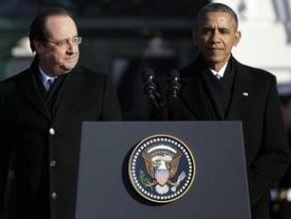|
World Jewish News

US President Barack Obama and French President Francois Hollande address a joint news conference in Washington, February 11, 2014. Photo: REUTERS
|
Obama: US will come down 'like a ton of bricks' on violators of Iran sanctions
11.02.2014, Israel and the World Private firms conducting business in Iran before international sanctions are lifted "do so at their own peril," US President Barack Obama said on Tuesday during a joint press conference with French President Francois Hollande.
Should businesses proceed with contracts in violation of sanctions imposed by the United States, the European Union and the United Nations Security Council, "we will come down on them like a ton of bricks," Obama said from the East Room of the White House.
The US president said world powers were "firm" in the sanctions regime, which has led to a dramatic contraction of the Iranian economy. But all are in agreement, Obama said, that new sanctions legislation during the current negotiations period could "endanger" prospects for a diplomatic solution to the nuclear crisis.
Republicans in the US Congress have threatened to use partisan procedural tactics to force a vote in the Senate on new sanctions against Iran, skeptical that an interim deal reached in November has truly halted Iran's march toward nuclear weapons capacity.
Eluding to criticisms in Congress, and to the standard Israel's government has set for any comprehensive accord between world powers and Iran, Obama said he would maintain a "very high threshold" for proof from Iran that its nuclear ambitions are limited to civilian power.
Responding to reports that a large French trade delegation plans on visiting Tehran this month, Hollande said he cannot control the travel of business executives as president of the republic.
"Companies just make their decisions when it comes to travel," he said, adding that he had made "clear" to French businessmen what sanctions entail.
"Sanctions will only be lifted if and when there is definite agreement," Hollande said. "During this period of the interim agreement, they remain in force."
"Toughness" forced Iran to agree to an interim deal, freezing much of their nuclear work in exchange for $7 billion in sanctions relief, Hollande said. But there is and will remain an "Iranian problem" until the Islamic Republic renounces its nuclear program, he added.
France has become a key ally to the US on matters of foreign policy in the Middle East. Hollande pointed out that, on the precipice of US military action against Syria last September in response to President Bashar Assad's use of chemical weapons against civilians, France was prepared to act in concert— where other allies, such as Great Britain, were not.
But France now supports the diplomatic path that opened in response to the threat of military force, he said. Hollande promised to exert "pressure" on Assad to remove all chemical weapons from Syria with haste.
Obama, who has been criticized for not using force against Assad after threatening to do so, proudly lauded the policy and said that Assad's chemical arms stockpile had now been "completely chronicled."
Hollande was honored at the White House in the first official state visit by a French president in nearly twenty years.
The French premier was welcomed with pomp, as French and American flags draped nearly a mile of Pennsylvania Avenue. Hollande arrived to cannon fire off the Potomac River and to a full display of the American guard.
Vice President Joseph Biden, US Secretary of State John Kerry and National Security Advisor Susan Rice were in attendance at the ceremony on the South Lawn.
In his opening remarks during their joint press conference, Hollande briefly mentioned US efforts at forging peace between Israel and the Palestinians, urging the parties to sign a framework for negotiations "now."
Obama, too, briefly mentioned the effort, noting that the EU would play a key role in the implementation of a final-status peace accord.
By MICHAEL WILNER
JPost.com
|
|
